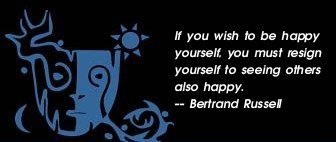|

Prometheus
© 2001 Kathleen Jenks, Ph.D.
Originally published in Myth*ing Links and used by permission
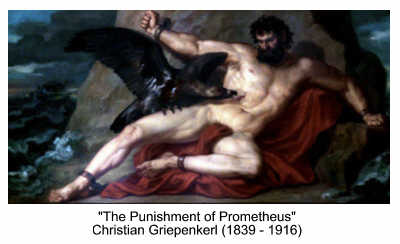
2-3 July 2001:
I never paid much attention to Prometheus until a few weeks ago. I knew the basics of his story of course: he was a Titan who cheated the gods and stole fire from Zeus, which resulted in a horrific punishment involving his liver.
I could sympathize with this Titan but I certainly couldn't relate to him. His story was a "guy thing". If you mess with Zeus, as Prometheus did, you must expect to pay the piper if you get caught. That's patriarchy. It has nothing to do with a feminist like me, sworn devotee of creative, healing goddesses like Kuan Yin, Vak, Hestia, Natseelit, Grandmother Spiderwoman, and Changing Woman. I'm not foolish enough to confront patriarchy directly — I tell stories like Scheherazade. I don't steal fire from under the noses of the status quo. My parents didn't raise an idiot.
When I think of Prometheus, I think of Beethoven, who wrote Promethean music — heavy, dark, brooding. Male artists portray Prometheus' virile strength, his crucifying agony, his unending endurance. He's a creature of muscles and torment; a heavy, messianic figure.
Nothing to do with me.
I do know that myths live us, whether we recognize them or not. James Hillman and other archetypal psychologists write eloquently on this topic. Freud resonated with Oedipus. Quite a few of my students feel lived by Hades' abducted wife, Persephone. Older women identify with Demeter's loss of her daughter, or with Hera's betrayal by her husband. One of my students is lived by Hephaestus; many others by Psyche and her trials in winning Eros; or by Inana's dark night in the Underworld; or by Parzival's Grail quest.
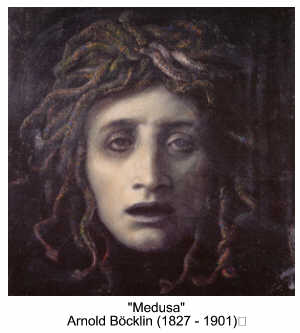 As for me, I resonate with Medusa, her deepest voice stolen through treachery beyond her control; the creative power of her right-brain usurped by the dark side of the too brilliant left-brained Athena; her traumatized son's waters of inspiration plundered by Greece's novice muses while he, Pegasus, who had churned up those springs with his wild hooves, remains mute. I sometimes feel surrounded by Medusa's psychic field, feeling the horror, the rage at so much spilled beauty, but also feeling swept away by the wonder that still exists, crying out to be expressed, shimmering like a garden of wild stars. It is as if Medusa's life-force is in hiding, still making love with blue-maned Poseidon on the floor of an ancient temple, still safely carrying Pegasus in her womb. In that psychic field, there is no cunning Athena, no conspiring Hermes, no Perseus butcher, no terrified horse emerging through the thin canal of his mother's severed throat instead of her birth canal. None of that. Instead, in my good times, I can breathe her, dance her, and pray her. My hair "serpents out" as hers did and I'm determined that her ancient fate won't be mine, for I've learned much since her time. As for me, I resonate with Medusa, her deepest voice stolen through treachery beyond her control; the creative power of her right-brain usurped by the dark side of the too brilliant left-brained Athena; her traumatized son's waters of inspiration plundered by Greece's novice muses while he, Pegasus, who had churned up those springs with his wild hooves, remains mute. I sometimes feel surrounded by Medusa's psychic field, feeling the horror, the rage at so much spilled beauty, but also feeling swept away by the wonder that still exists, crying out to be expressed, shimmering like a garden of wild stars. It is as if Medusa's life-force is in hiding, still making love with blue-maned Poseidon on the floor of an ancient temple, still safely carrying Pegasus in her womb. In that psychic field, there is no cunning Athena, no conspiring Hermes, no Perseus butcher, no terrified horse emerging through the thin canal of his mother's severed throat instead of her birth canal. None of that. Instead, in my good times, I can breathe her, dance her, and pray her. My hair "serpents out" as hers did and I'm determined that her ancient fate won't be mine, for I've learned much since her time.
Something shifted a few weeks ago. I was deeply depressed. A science fantasy novel I had completed on February 1 fell into an unexpected limbo for nearly five numbing months when promised contacts failed to come through; several other projects begun with high hopes had also fizzled.
Unfortunately, this is a pattern that has happened with wearying frequency over the decades. For more than half a century now I have continually tried to spin wonder into my little corner of the world, and yet I keep getting shot down, let down, stuck between the cracks, over and over. I'm pulled apart during the too bright and demanding days, and think I can't endure a moment more. But then, somehow, during the night, I am knit together again as sleep once more puts velvet between the vertebrae (to paraphrase Henry Miller). Somehow, I keep going on — and on, until a door is slammed in my face all over again.
Lately, there have been just too many doors that open with a glimmer of hope, only to slam shut, one after another. It becomes a kind of mockery, this elusive Pandora-hope, the oracular portents, the well-meaning supporters. It becomes a painful hook, one more trap. Would I not be wiser to release the old hopes stuck at the bottom of Pandora's box? to take up gardening or weaving and forget the big dreams? At times in one's life, hope is futile, for hope, as T. S. Eliot writes, "would be hope for the wrong thing."
If I fail to renounce hope it means I risk dying angry and bitter — and that's something I'm not willing to do. If small moments of gladness are all I have been allotted, then I wish to recalibrate my consciousness so that I'm more sensitive to their presence and can enjoy them fully. As long as I hold onto bigger hopes, I continue to function at a too intense level of striving, and I continue to feel ravaged.
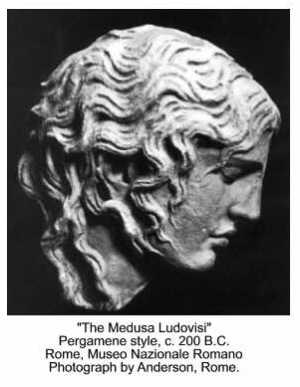 Well, I asked myself a few weeks ago, what does all this feel like? What is this endless, endless striving all about? Medusa? — no, this aspect of my life doesn't feel like her. As far as Greek myth is concerned, her head's cut off, kaput, and that's that. The severed head functions beyond Medusa's life and turns men to stone but that's Athena's perverse business, not Medusa's. What I'm trapped in is a continual cycle .... That isn't Medusa. Well, I asked myself a few weeks ago, what does all this feel like? What is this endless, endless striving all about? Medusa? — no, this aspect of my life doesn't feel like her. As far as Greek myth is concerned, her head's cut off, kaput, and that's that. The severed head functions beyond Medusa's life and turns men to stone but that's Athena's perverse business, not Medusa's. What I'm trapped in is a continual cycle .... That isn't Medusa.
Who then? Why do I keep spilling myself out, constantly revving up my energies for one more go at trying to make a difference, only to get screwed all over again?! Why?! What myth or tale is living me? Am I doomed to drudge in the ashes like Cinderella, awaiting an invitation to a ball, which, in my case, never comes? What does it feel like? I need to get to the bottom of this.
What does it feel like? Like having the liver torn out of me, I replied from a dark, secret place. No, I protested. That would be a Promethean pattern, a 'guy thing". I scuttled backwards, uneasy, away from the muscular Titan.
Yet I know that in Chinese medicine, the liver is the planner, the architect, the one who understands governance. When the liver is thwarted for too long (despite all its well thought-out, careful plans), dangerous frustration can result and the body can be damaged. Laughter, I am told by a friend who specializes in Chinese medicine, will help soothe the angry liver. So when I'm most frustrated (and my liver is most at risk), I try to watch humorous programs on TV. Reruns of *M*A*S*H always work, and Cheers. Also HBO's Sex & the City. But much of what passes for humor on TV these days is written by, and for, maturity-challenged, twenty-something, male dysfunctionals. My liver, or inner architect, is infuriated by such dreck. So I prefer to watch well-written, gloomy things instead.
As this recent depression deepened, I kept seeing an image of Prometheus being ravaged all night by a great vulture-like bird, but the image remained static, remote, nothing to do with me. Or perhaps it's that I froze it, unwilling to allow it any vitality. One reason I resisted is that my memory of his myth was that Prometheus had been torn apart all night by Zeus's bird — and for me, night is the sacred time, the only time of respite. Nocturnal myths can be valenced, or charged, positively or negatively. In other words, night can be seen as the sacred, rich, ripe womb of all creativity — or as a place of destruction and utter despair. A negatively charged nocturnal myth like Prometheus' could not be living me because it would violate my deepest perception of the night. Therefore, the image I kept getting had to be generic, part of the collective, but not personally relevant to me.
I began working on my website's "Fire Deities" page a few weeks ago. I found intriguing links for Greece's smith god Hephaestus as well as for Prometheus, whose theft of fire clearly gave him the right to be on the page. I grokked the links carefully, enjoying the work, yet feeling only a minimal emotional connection to these deities.
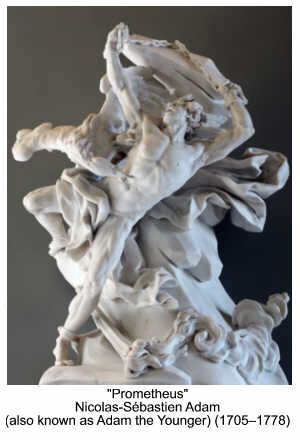 Then, late one night, I discovered to my astonishment that I had made a mistake about Prometheus' myth, for his liver actually repaired itself during the night. It was during the day that Zeus' eagle (a sun-symbol, after all) tore Prometheus apart! Further, as one site pointed out, it wasn't just from Zeus that Prometheus stole fire — he stole it from the status quo, the system, the canon, the "way things are." Here's the passage that riveted my attention: Then, late one night, I discovered to my astonishment that I had made a mistake about Prometheus' myth, for his liver actually repaired itself during the night. It was during the day that Zeus' eagle (a sun-symbol, after all) tore Prometheus apart! Further, as one site pointed out, it wasn't just from Zeus that Prometheus stole fire — he stole it from the status quo, the system, the canon, the "way things are." Here's the passage that riveted my attention:
The world's enduring myths can be seen as a form of hypertext, with readers from succeeding generations adding layers of annotation as they recognize aspects of their own lives and struggles reflected in the ancient stories. Controversial New York artist and educator Tim Rollins is bringing the myth of Prometheus to the Web, with the help of a posse of young black and Puerto Rican artists who can relate to the story of a rebel Titan who steals fire from the gods, and incurs the wrath of the powers that be.... [From "NY Artist Helps Street Kids Steal Fire" by Steve Silberman at: www.wired.com/news/topstories/0,1287,6955,00.html]
So it's not just a "guy thing". It's societal, cultural, mythic, non-gendered. It applies to anyone seriously involved in the arts, education, community, humanitarian, and socio-environmental issues. Those were the pieces I needed: night, art, rebellion, healing, fire.
Like many intense people, I'm a night person. That's when I heal. The too bright sun, the demands of clocks and colleagues — all these tear me apart. In the daytime, there's no respite. Time itself turns rabid and ragged. I'm clawed apart — always have been — and the projects birthed in the night, the rich and fertile night, arrive painfully stillborn and burnt black by day's sun, Zeus' eagle. It was right in front of me all the time, hidden in the glaring sunlight: the myth living the greater part of my creative life has been Prometheus.
It was a shock to recognize this, but also exhilarating, for it tells me that my nature really is to steal fire for others, but also for myself, for I too need that numinous magic, that gladness. (FYI: in Chinese medicine, my element is fire; in western astrology, both my moon and rising are in the fire sign of Sagittarius.)
For me, and perhaps for all the rest of us caught up in kindred ventures, that means that even if all our big projects are stillborn forever, we can still steal moments of gladness — for joy and gladness are fiery by nature, and must be stolen when the status quo crushes us so much that we risk forgetting the greater, underlying interconnectedness of all life, the "jeweled web", as Buddhism calls it. By rebelling against heavy, messianic gloom, we can steal those moments of gladness, of delight in simple, earthy things and, despite all disappointments, we can refuse to die bitter. That in itself is both solace and triumph.

After I thought I had completed this essay, I came across Goethe's poem, "Prometheus," and found in it another way of expressing all this. It is with these lines that I now conclude:
... Did you, by chance, suppose
that I should hate life,
flee into deserts,
just because
not all my fancy dreams
had come to pass?
I sit here, shaping men and women
in my image,
a race destined, like I,
to suffer and to cry,
to savor joy, to laugh,
and disregard you
as I did.
[Eric Harth, translator, found at: www.cnbc.cmu.edu/~noelle/fun/prometheus.html]
 Kathleen Jenks has a Ph.D. in Religious Studies from the University of California, Santa Barbara. In 2003, two years after writing this "Prometheus" essay for her Myth*ing Links website, she retired from nine years of teaching in the Mythological Studies program at Pacifica Graduate Institute. Relocating to a small rural town near Lake Michigan, she and her five cats now live simply in an ivy-covered house surrounded by herb gardens and drifts of lavender; here, she does freelance writing and consulting. Her published books include Journey of a Dream Animal: A Human Search for Personal Identity Kathleen Jenks has a Ph.D. in Religious Studies from the University of California, Santa Barbara. In 2003, two years after writing this "Prometheus" essay for her Myth*ing Links website, she retired from nine years of teaching in the Mythological Studies program at Pacifica Graduate Institute. Relocating to a small rural town near Lake Michigan, she and her five cats now live simply in an ivy-covered house surrounded by herb gardens and drifts of lavender; here, she does freelance writing and consulting. Her published books include Journey of a Dream Animal: A Human Search for Personal Identity (Julian Press, 1975), an exploration of dreams from a Jungian perspective with a foreword by Jean Houston; and The River and the Stone: Moses' Early Years in Egypt (Julian Press, 1975), an exploration of dreams from a Jungian perspective with a foreword by Jean Houston; and The River and the Stone: Moses' Early Years in Egypt (Dutton, 1977), a novel about Miriam, Aaron, and Moses set during their youth in ancient Egypt. She is also the author, albeit under the pseudonym Jennifer Stephens, of Silver Rose (Dutton, 1977), a novel about Miriam, Aaron, and Moses set during their youth in ancient Egypt. She is also the author, albeit under the pseudonym Jennifer Stephens, of Silver Rose , a romance set around a production of "The Lady's Not for Burning", and Vengeance of the Cat Goddess , a romance set around a production of "The Lady's Not for Burning", and Vengeance of the Cat Goddess . More recently, 2003-2004, she contributed 21 lengthy entries to the 11-volume encyclopedia, Gods, Goddesses, and Mythology . More recently, 2003-2004, she contributed 21 lengthy entries to the 11-volume encyclopedia, Gods, Goddesses, and Mythology (Marshall Cavendish Reference, 2005). In 2005 she was the mythology/religion/psychology consultant for The Journey to Wild Divine: Wisdom Quest, the second in an exceptional series of video games using biofeedback; she also wrote the game's journal-style Companion Guide. A science fantasy novel, The Light Harp, is forthcoming (spring 2008) along with her Green World Oracle (autumn 2008) — both with Creatrix. Her Myth*ing Links website on cross-cultural myths, lore, art, and sacred traditions, consistently wins high praise from educators, students of all ages, and the general public. (Marshall Cavendish Reference, 2005). In 2005 she was the mythology/religion/psychology consultant for The Journey to Wild Divine: Wisdom Quest, the second in an exceptional series of video games using biofeedback; she also wrote the game's journal-style Companion Guide. A science fantasy novel, The Light Harp, is forthcoming (spring 2008) along with her Green World Oracle (autumn 2008) — both with Creatrix. Her Myth*ing Links website on cross-cultural myths, lore, art, and sacred traditions, consistently wins high praise from educators, students of all ages, and the general public.
Photo by Kelly Leal www.kellyleal.com, used by permission.
Return to Passages Menu
Subscribe to the Passages e-zine
|
